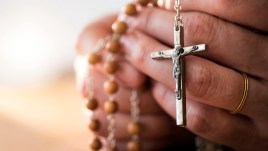
Religious Diversity Around the World
Singapore is the world’s most religiously diverse country overall as of 2020, while Yemen is the least diverse. But the U.S. ranks first among nations with very large populations, followed by Nigeria and Russia.
Singapore is the world’s most religiously diverse country overall as of 2020, while Yemen is the least diverse. But the U.S. ranks first among nations with very large populations, followed by Nigeria and Russia.
All
Publications
Timeline provided by Stateline.org Return to the death penalty issue page The Death Penalty Since 1972 (Links to U.S. Supreme Court decisions provided by oyez.org and the Web site of the U.S. Supreme Court) 1972 Furman v. Georgia: The U.S. Supreme Court effectively voids 40 state death penalty statutes and suspends capital punishment, ruling that […]
On Thursday Dec. 6, Mitt Romney will deliver an address outlining the way his religious faith has influenced his political career. Recent Pew polling finds that Romney, more than any other presidential candidate (Republican or Democrat), is viewed as very religious by the public. This perception is, for the most part, an asset for Romney’s […]
Pew Forum Faith Angle Conference Key West, Florida Video Highlights http://blip.tv/scripts/flash/showplayer.swf?autostart=false&brandname=Pew%20Forum&brandlink=https://www.pewresearch.org/religion&showplayerpath=http://blip.tv/scripts/flash/showplayer.swf&file=http://religionfactor2008.blip.tv/rss/flash?sort=date&nsfw=dc&user=GreenForum&showguidebutton=false&showsharebutton=true&showfsbutton=true&showplaylist=true Some of the nation’s leading journalists gathered in Key West, Fla., in December 2007 for the Pew Forum’s biannual Faith Angle Conference on religion, politics and public life. John Green, author of The Faith Factor: How Religion Influences American Elections, described how George Bush’s […]
On Thursday, Dec. 6, Mitt Romney delivered a speech addressing his Mormon faith and the role of religion in public life. Recent polling from the Pew Research Center1 finds that Romney, more than any other presidential candidate (Republican or Democrat), is viewed as very religious by the public. This perception is, for the most part, […]
Many religious “nones,” which include atheists and agnostics, in 22 countries hold religious or spiritual beliefs, such as in an afterlife or something beyond the natural world.
Nearly half of U.S. adults are connected to Catholicism. Read about going to Mass, Communion, confession and more.
After years of decline, the U.S. Christian share now shows signs of leveling off. The new Religious Landscape Study explores trends in identity, beliefs and practices.
The Global Religious Futures (GRF) project is jointly funded by The Pew Charitable Trusts and The John Templeton Foundation. Here are some big-picture findings from the GRF, together with context from other Pew Research Center studies.




